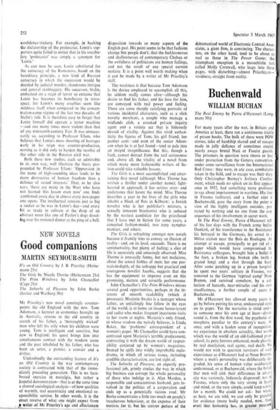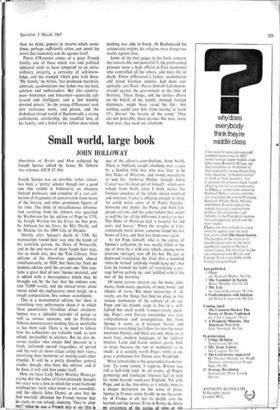Buchenwald
WILLIAM BUCHAN
For many years after the war, in Britain and America at least, there ran a continuous trickle
of prison books. The bulk of these were POW stories, tales of hardship shared and of escapes made in jolly defiance of sometimes stupid, nearly aways brutal Nazi or Fascist guards. The prisoners in question were (more or less) under protection from the Geneva convention. under some surveillance from the International Red Cross: they were, in any case, combatants taken in the field, and to escape was their duty. Only Christopher Burney's Solitary Confine- ment, which made no splash on its first appear. ance in 1952, had something more profound to say about imprisonment in wartime. His time in Fresnes (solitary), and a further stint it Buchenwald, gave the story from the point o; view of the highly intelligent outsider, pro tected by nothing and no one from the con sequences of his involvement in secret work.
In The Real Enemy, Pierre d'Harcourt tell. of his last days with the French army befon Dunkirk, of his transference to the Resistance his betrayal to the Germans, his arrest in Metro station near the Bois de Boulogne. AT attempt at escape, principally to get rid of paper which would have compromised hi! Resistance colleagues, brought him a bullet it the foot, a broken leg, broken ribs (with grazed lung) and a shot through the back After some patching up in a prison hospital he spent two years' solitary in Fresnes, was removed to the German 'reprisal camp' Neue Bremm, and survived somehow, by a col- lection of hazards, near-miracles and his own steadfastness, a further couple of years it Buchenwald.
Mr d'Harcourt has allowed many years tc go by before putting his terse, undecorated story on to paper. Yet the narrative is vivid and— to someone near his own age at Least—draws round it, from the first word, the psychotic at- mosphere peculiar to this century's wars. At once, and with a leaden sense of recognition we experience in absolute actuality, that world which was the world of an old-fashioned prep- school, its petty horrors enhanced, made ghastl. by real mutilation, real agony, real death. We would not wish to question survivors of such experiences as d'Harcourt had at Neue Bremm. where a man's personality was deliberately de- graded, his sense of human value assiduously undermined, or at Buchenwald, where the belief that men will sink their differences in adver- sity was variously, hideously disproved; nor in Fresnes, where only the very strong in heart and mind, or the very simple, could keep sanity for a month. We could not ask : but when as here, we are told, we can only be grateful for evidence (more badly needed, now, than ever) that humanity has, in greater measus
than we think, powers in reserve which some- times, perhaps sufficiently often, can annul the worst that humanity can do against itself.
Pierre d'Harcourt comes of a great French family, one of those which war and political upheaval seem to have tempered to an extra- ordinary integrity, a certainty of self-know- ledge, and the strength which goes with these. 'My family,' he writes, 'has produced marshals, admirals, academicians (my father was the last), scholars and ambassadors. But also country- men—huntsmen and fishermen—generally cul- tivated and intelligent; and a few humbly devoted priests.' So the young d'Harcourt took into resistance work, and prison, and the diabolical cloSed world of Buchenwald, a strong catholicism, scholarship, the steadfast love of his family, and a belief in his fellow-men which
nothing was able to break. At Buchenwald his aristocratic origins, his religion, were dangerous marks against him.
Some of the best pages in his book concern the remarkable and powerful T, the professional prisoner (now a high official in East Germany) who controlled all the others, did their life or death. Pierre d'Harcourt's father, academician and noted German scholar, had been out- spokenly anti-Nazi: Pierre himself had demon- strated against the government at the time of Stavisky. These things, and the tireless efforts on his behalf of his family, through foreign diplomats, might have saved his life: but nothing could save him from having to learn (T's phrase) 'the lessons of the camp.' They are not palatable, those lessons, but now, more than ever, they need our attention.



































 Previous page
Previous page